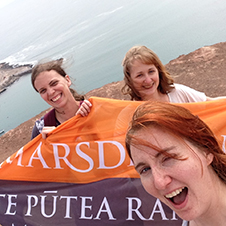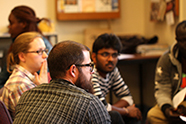 Oh the places you'll go!
Oh the places you'll go!
Postgraduate study is where the fun really begins. There are enough 400-level papers that you can take those papers that pertain specifically to your areas of study. PGDipSci, Honours and first-year MSc applications must secure a supervisor and complete the online application form. Any queries should be directed to the Department's 400-level Administrator: Email anatomy.400-level.admin@otago.ac.nz.
All our postgraduate degrees have a research component and the opportunities that come out of this kind of study are enormous.
The Department provides study space for all postgraduate students with access to computing resources and all necessary research facilities and resources are provided.
All postgraduate students are also provided with access to funds to assist with travel to conferences to present their work. The level of support depends on the degree being studied.
In their thesis year(s) students can apply for scholarships. The University offers scholarships for Master's thesis and Doctoral (PhD) study. The Department also advertises PhD projects twice a year for which Departmental Scholarships are available to suitably qualified applicants.
Postgraduate students are also able to apply for demonstrating positions in the Department's undergraduate courses. This not only provides postgraduate students with a valuable opportunity to develop teaching skills, but also provides a source of supplementary income.
Below are brief summaries of the various postgraduate options available through the Department.
Bachelor of Science with Honours (BSc(Hons))
This is a one-year full-time programme involving papers and a research project. Study at this level can increase your career options and job prospects after graduation.
Completion of this degree to the required standard, can lead to acceptance into a Master's by thesis only or PhD programme.
Criteria for admission:
- Candidates will have completed a BSc with at least five 300-level papers, including at least four 300-level Anatomy papers.
- Candidates must normally have achieved a B+ average, or better, in the 300-level Anatomy papers.
Admission is conditional upon meeting the academic criteria AND securing a supervisor for your research project.
The programme comprises:
- ANAT 490 (Dissertation) - a 60 point research project which includes a literature review
- Plus three 400-level papers (worth 20 points each)
More detailed information about this degree can be found on the main University site: Study Anatomy at Otago
Bachelor of Biomedical Sciences with Honours (BBiomedSc(Hons))
This is a one-year full-time programme consisting largely of a research project.
There are a number of majors that BBiomedSc(Hons) students can specialise in. While this Department teaches into the 'Reproduction, Genetics and Development' major of the undergraduate BBiomedSc degree – students can complete an Hons degree with an appropriate member of staff under another theme, for example, students have completed an Honours in 'Functional Human Biology' with one of our clinical anatomists and in 'Drugs and Human Health' with one of our neuroscientists.
Completion of this degree to the required standard, can lead to acceptance into a Master's by thesis only or PhD programme.
Criteria for admission:
- Candidates will have completed a BBiomedSc degree, or an equivalent qualification, with an average grade of at least B+ for the appropriate 300-level papers;
- Candidates must normally have passed papers worth at least 126 points, at 200-level or above, during the third year of study for the degree of Bachelor of Biomedical Sciences (or equivalent).
Admission is conditional upon meeting the academic criteria AND securing a supervisor for your research project.
The programme comprises:
- A research project (85%), including a literature review – submitted as a thesis.
- A small (15%) component of course work.
More detailed information about this degree can be found on the main University site: BBiomedSc(Hons)
Bachelor of Medical Science with Honours (BMedSc(Hons))
This is a one-year full-time programme in the field of medical science. This programme is only available to students completing a Bachelor of Medicine and Bachelor of Surgery (MBChB) degree.
Criteria for admission:
- Candidates will have satisfactorily completed three or more years of study towards a MBChB degree.
- Candidates must make application by the closing date each year (as published by the Otago Medical School).
Admission is conditional upon meeting the academic criteria AND securing a supervisor for your research project. The Department advertises available projects through the Otago Medical Schools annual process. However, students are also welcome to make direct approaches to staff undertaking research in an area of their interest. You can find potential projects and supervisors by exploring the Department's research interests: Research
The programme comprises:
- A year of full-time research culminating in the submission of a thesis.
More detailed information about this degree (including the application procedure) can be found on the main University site: BMedSc(Hons)
Postgraduate Diploma in Science (PGDipSci)
This is a one-year course involving papers and a research project. (Part-time candidates can take this course over more than a year).
Completion of this diploma to the required standard, can lead to acceptance into Master's by thesis only.
Criteria for admission:
- Candidates will have completed a BSc or an equivalent qualification approved by the Head of Department.
- Candidates must normally have achieved a B average, or better, in four 300-level Anatomy papers or equivalent papers approved by the Head of Department.
Admission is conditional upon meeting the academic criteria AND securing a supervisor for your research project.
The programme comprises:
- ANAT 480 (Research Project) - a 40 point project which includes a literature review.
- Plus four, 400-level papers (worth 20 points each).
Note: the PGDipSci can also lead directly to a PhD if students take ANAT 490 instead of ANAT 480 (Head of Department approval required).
More detailed information about this degree can be found on the main University site: Study Anatomy at Otago
Master of Science (MSc)
Papers and Thesis:
The Master's degree by papers and thesis is a two year full-time programme. (Part-time candidates can take this course over a longer period.)
Completion of a MSc to an appropriate standard can lead to acceptance into a PhD.
Criteria for admission:
- Candidates will have completed a BSc or an equivalent qualification approved by the Head of Department.
- Candidates must normally have achieved a B average, or better, in four 300-level Anatomy papers or equivalent papers approved by the Head of Department.
Admission is conditional upon meeting the academic criteria AND securing a supervisor for your research project.
The programme comprises:
- At first year:
- ANAT 495 (Master's Thesis Preparation) - a 40 point project which includes a literature review.
- Plus four, 400-level papers (worth 20 points each).
- At second year:
- Research only, culminating in the writing up of a thesis.
Thesis Only:
A Master's degree by thesis only is a one-year programme. (Part-time candidates can take this course over a longer period.)
Criteria for admission:
- Candidates will have completed a BSc(Hons) or PGDipSci or an equivalent qualification approved by the Head of Department.
- Candidates must normally have achieved a B+ average, or better, across all 400-level papers, including the research component.
Admission is conditional upon meeting the academic criteria AND securing a supervisor for your research project.
More detailed information about this degree can be found on the main University site: Study Anatomy at Otago
More information about the thesis component can be found on the main University site: Research (Thesis) Masters' Degrees
Master of Biomedical Sciences (MBiomedSc)
The Master of Biomedical Sciences degree is a one year research (thesis) master's degree available to students who have completed an honours degree or postgraduate diploma. The MBiomedSc majoring in Reproduction, Genetics and Development can be completed in the Department of Anatomy.
Further specific details about entry requirements and the application process can be found on the main University site: MBiomedSc
Doctor of Philosophy (PhD)
This is a research only degree that usually comprises 3 years of full-time study. (Part-time candidates can take this course over a longer period.)
Criteria for admission:
- Candidates will have completed a) an Otago BSc(Hons) or MSc, or b) an equivalent international degree, or c) have equivalent research experience.
- Candidates will normally have completed their qualifying degree to at least a B+ average, and preferably to a minimum of A-.
Admission is conditional upon meeting the academic criteria AND securing a supervisor for your research project.
More detailed information about this degree can be found on the main University site: Doctor of Philosophy (PhD).
For information about PhD Scholarships offered by the Department of Anatomy please go to opportunities
Postgraduate Diploma in Surgical Anatomy (PGDipSurgAnat)
This is a distance taught one-year course aimed at junior doctors wishing to pursue a career in surgery or radiology.
- The programme focuses on Surgical Anatomy i.e. anatomy relevant to surgical pathology, surgical procedures and surgical complications.
- Is taught by Surgical Anatomists i.e. surgeons with a major interest in anatomy education and anatomists with a surgical background, together with Consultant Radiologists.
- Includes cadaver dissection. There will be a combination of targeted dissections of generic interest and free dissection for candidates wishing to investigate subspecialty-specific areas of interest.
- Recognises that candidates will be entering SET training programmes. Although the focus is on a thorough understanding of generic surgical anatomy, flexible components of the course encourage the study of specialty-specific anatomy.
- Excellent facilities. The Anatomy Museum houses more than 3,000 anatomical specimens, radiographs and models. The Department has an active Clinical Anatomy research programme and excellent links with surgeons and radiologists at Dunedin Public Hospital.
For more information on this degree please go to the main University website PGDipSurgAnat
You can also contact: surgical.anatomy@otago.ac.nz
Postgraduate research projects
A full list of postgraduate research projects undertaken through the Department of Anatomy can be found on the main University database.
Quick Fact
Students doing postgraduate degrees in other majors can still base their research project in the Department of Anatomy... more info
Emerging Researchers Group

The ERG is a support network who meet regularly to discuss research issues and present seminars. They also run a weekly journal club. Emerging Researchers Group
Recent Graduate Profile

Caine Smith didn't know he wanted to become a scientist until the final year of his BSc degree. That is when he decided to do a Masters degree in Neuroscience. He conducted his research in the Department of Anatomy, looking at the effects of fetal alcohol exposure.
Today Caine is employed as a technician at the New South Wales Tissue Resource Centre, a brain bank located at the University of Sydney. He loves the variety in his job, and uses his neuroscience knowledge everyday.
“A postgraduate degree sets you above the rest and adds skills to your repertoire that you just don't get in undergrad. And it shows that you are serious about science” he says.
